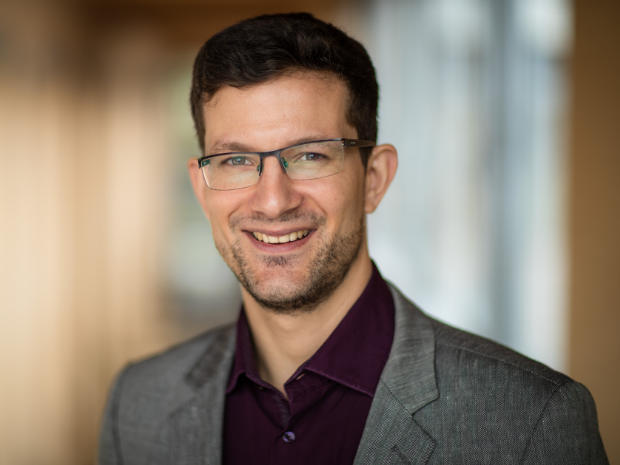
- Programme studied: PhD, Employment Relations and Organisation Behaviour
- Year of Graduation: 2015
- LinkedIn profile
Meet our Alum of the Month, Dr Chris Moos. Dr Chris Moos completed his PhD in Employment Relations and Organisation Behaviour in 2015 after successfully defending his thesis 'A sociology of rankings: A longitudinal examination of the Financial Times MBA rankings'. Since leaving the LSE Dr Moos has become a Lecturer in Organisation Studies at the University of Oxford. He is also a Senior Common Room Member and College Adviser at St Antony’s College.
Tell us about your career journey since graduating from LSE.
I first took a position focused on teaching, but received a lot of support for developing my own research programme, resulting in my lectureship including both research and teaching. In terms of the latter, I’ve moved from teaching undergrads and MSc students at the LSE to working on the Oxford MBA, EMBA, Diploma and Executive Education programmes, which required me to learn a very different style of teaching and student engagement. By definition, ‘business schools’ bring to together the world of business and academia, so the classroom really is where the magic happens. Like at LSE, Oxford students bring their extraordinary backgrounds and sets of experiences to the classroom, so no class is like the other. Learning from, and with students has been a challenging, yet very rewarding learning journey for me.
Can you provide a short summary of your PhD thesis and how it shaped the direction of your academic career?
I developed a sociology of rankings, in particular how organisations deal with pressures from external performance measures. Modern organisations are typically exposed to a multitude of expectations from stakeholders. External performance measures like rankings crystalise those expectations, so make for a good starting point for understanding the complex environment organisational leaders deal with. This has been my entry point into the study of institutional complexity – how organisations and leaders deal with a multitude of competing expectations.
Regarding teaching, working at the intersection of performance measurement and organisations has helped me understand measures and controls as part of the core toolkit of organisational leaders – whether it is for motivation, decision making, organisational culture or design. Now, I am building on this experience to work on the integration of the Oxford MBA, bringing together the world of practice and faculty from across Saïd Business School. Most recently we had our MBA students present on the integrated accounting, operational, organisational and leadership issues that Danone and Rio Tinto are facing. Whether back then at LSE, or now at Oxford, approaching complex problems in a cross-disciplinary, integrated way produces fascinating insights.
What has been the biggest challenge you have faced in your career, and what have you learned from it?
Coming from LSE, gearing my research focus more toward organisation theory journals was a big challenge. It has meant I had to take a big step away from my initial training and switched from quantitative to ethnographic and configurational methods. For example, my research shows how in the eyes of their diverse stakeholders, organisations find different configurations of responses to the traditional expectation of creating an economic surplus, while at the same time responding to the newer expectations to be diverse and sustainable. My data shows that there is no ‘one best way’ of gaining approval from those diverse stakeholders, but multiple, equivalent ways. I call that plurality in pluralism. My main learning from all of this is that carving out a niche of expertise at the boundary of knowledge requires the courage to be different, a lot of dedication, and a supportive environment – I could not have done it without my wonderful mentors Tim Morris (MSc Industrial Relations 1980 and PhD Industrial Relations 1984) and Michael Smets.
What is your current research focus?
I focus on institutional complexity and pluralism, paradox, leadership, and holistic social evaluations. In terms of contexts, I study leaders, from CEOs of global corporations to museum directors, as well as organisations like business schools. For example, I propose that many organisations are still measuring diversity in very simplistic ways – essentially counting what can be seen. Of course, that only goes so far in understanding employees that have multiple, interacting identities. Ultimately, as the world is growing more pluralistic, leaders need more complex tools to deal with both visible and invisible diversity. My hope is to help organisational leaders understand how they can appeal to an increasingly diverse set of stakeholders.
As a social scientist, it’s good to be humble and remember that most researchers only have a very modest impact on the world they are studying. That said, as the world is growing more pluralistic, tensions seemingly abound. I think there is a great opportunity for social scientists to help leaders find approaches that work across different stakeholders’ values and expectations. I will be very happy if through my work my students, and some organisational leaders will gain a greater appreciation of the complexity of today’s world, and have better tools for dealing with it.
Share with us your fondest memory of the Department of Management.
It was a privilege to work with my PhD supervisor Paul Willman on the first iterations of the Executive Global Master’s in Management (EGMiM) programme. As I can tell now, its integrated approach across the disciplinary boundaries of the social sciences was and still is ground-breaking. A very LSE way of doing things, which has shaped my thinking about how different disciplines can be integrated to provide for a more holistic understanding of organisations. I am glad I got to be part of it. In fact, the book Paul wrote for the EGMiM, ‘Understanding Management: The Social Science Foundations’ is lying next to me as we speak – I still revisit chapters to remind myself of why we are studying management the way we do.